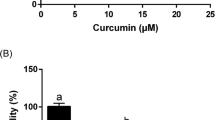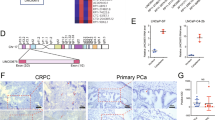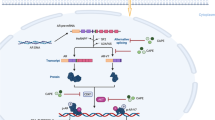Abstract
Recently, studies have investigated the significance of the Wnt/β-catenin pathway in prostate cancer. The transcriptional activity of the androgen receptor (AR) is modulated by interaction with coregulators, one of which is β-catenin. Curcumin, a dietary yellow pigment of Curcuma longa, has emerged as having a chemopreventive role. Although curcumin has been shown to inhibit AR expression, its molecular mechanism has not been fully elucidated. In this study, whether curcumin mediates the Wnt/β-catenin signaling pathway with regard to AR/β-catenin interactions was studied. Curcumin was shown to induce significant inhibition of AR expression in a dose-dependent manner. Marked curcumin-induced suppression of β-catenin was shown in the nuclear and cytoplasmic extracts as well as whole cell lysates. Further analysis revealed that phosphorylation of Akt and glycogen synthase kinase-3β were attenuated, but phosphorylated β-catenin was increased after curcumin treatment. Finally, cyclin D1 and c-myc, the target gene of the β-catenin/T-cell factor transcriptional complex, were also decreased. These findings suggest that curcumin modulates the Wnt/β-catenin signaling pathway and might have a significant role in mediating inhibitory effects on LNCaP prostate cancer cells.
This is a preview of subscription content, access via your institution
Access options
Subscribe to this journal
Receive 4 print issues and online access
$259.00 per year
only $64.75 per issue
Buy this article
- Purchase on Springer Link
- Instant access to full article PDF
Prices may be subject to local taxes which are calculated during checkout




Similar content being viewed by others
References
Jemal A, Siegel R, Ward E, Hao Y, Xu J, Thun MJ . Cancer statistics, 2009. CA Cancer J Clin 2009; 59: 225–249.
Hebert JR, Hurley TG, Olendzki BC, Teas J, Ma Y, Hampl JS . Nutritional and socioeconomic factors in relation to prostate cancer mortality: a cross-national study. J Natl Cancer Inst 1998; 90: 1637–1647.
Rahman M, Miyamoto H, Chang C . Androgen receptor coregulators in prostate cancer: mechanisms and clinical implications. Clin Cancer Res 2004; 10: 2208–2219.
Verras M, Sun Z . Roles and regulation of Wnt signaling and beta-catenin in prostate cancer. Cancer Lett 2006; 237: 22–32.
Truica CI, Byers S, Gelmann EP . Beta-catenin affects androgen receptor transcriptional activity and ligand specificity. Cancer Res 2000; 60: 4709–4713.
Yang F, Li X, Sharma M, Sasaki CY, Longo DL, Lim B et al. Linking beta-catenin to androgen-signaling pathway. J Biol Chem 2002; 277: 11336–11344.
Mulholland DJ, Cheng H, Reid K, Rennie PS, Nelson CC . The androgen receptor can promote beta-catenin nuclear translocation independently of adenomatous polyposis coli. J Biol Chem 2002; 277: 17933–17943.
Clevers H . Wnt/beta-catenin signaling in development and disease. Cell 2006; 127: 469–480.
MacDonald BT, Tamai K, He X . Wnt/beta-catenin signaling: components, mechanisms, and diseases. Dev Cell 2009; 17: 9–26.
Chesire DR, Isaacs WB . Beta-catenin signaling in prostate cancer: an early perspective. Endocr Relat Cancer 2003; 10: 537–560.
Doble BW, Woodgett JR . GSK-3: tricks of the trade for a multi-tasking kinase. J Cell Sci 2003; 116: 1175–1186.
Sharma M, Chuang WW, Sun Z . Phosphatidylinositol 3-kinase/Akt stimulates androgen pathway through GSK3beta inhibition and nuclear beta-catenin accumulation. J Biol Chem 2002; 277: 30935–30941.
Ohigashi T, Mizuno R, Nakashima J, Marumo K, Murai M . Inhibition of Wnt signaling downregulates Akt activity and induces chemosensitivity in PTEN-mutated prostate cancer cells. Prostate 2005; 62: 61–68.
Mulholland DJ, Dedhar S, Wu H, Nelson CC . PTEN and GSK3beta: key regulators of progression to androgen-independent prostate cancer. Oncogene 2006; 25: 329–337.
Yardy GW, Brewster SF . Wnt signalling and prostate cancer. Prostate Cancer Prostatic Dis 2005; 8: 119–126.
Chesire DR, Ewing CM, Gage WR, Isaacs WB . In vitro evidence for complex modes of nuclear beta-catenin signaling during prostate growth and tumorigenesis. Oncogene 2002; 21: 2679–2694.
de la Taille A, Rubin MA, Chen MW, Vacherot F, de Medina SG, Burchardt M et al. Beta-catenin-related anomalies in apoptosis-resistant and hormone-refractory prostate cancer cells. Clin Cancer Res 2003; 9: 1801–1807.
Chen G, Shukeir N, Potti A, Sircar K, Aprikian A, Goltzman D et al. Up-regulation of Wnt-1 and beta-catenin production in patients with advanced metastatic prostate carcinoma: potential pathogenetic and prognostic implications. Cancer 2004; 101: 1345–1356.
Sharma RA, Gescher AJ, Steward WP . Curcumin: the story so far. Eur J Cancer 2005; 41: 1955–1968.
Aggarwal BB . Prostate cancer and curcumin: add spice to your life. Cancer Biol Ther 2008; 7: 1436–1440.
Dorai T, Gehani N, Katz A . Therapeutic potential of curcumin in human prostate cancer-I. Curcumin induces apoptosis in both androgen-dependent and androgen-independent prostate cancer cells. Prostate Cancer Prostatic Dis 2000; 3: 84–93.
Nakamura K, Yasunaga Y, Segawa T, Ko D, Moul JW, Srivastava S et al. Curcumin down-regulates AR gene expression and activation in prostate cancer cell lines. Int J Oncol 2002; 21: 825–830.
Tsui KH, Feng TH, Lin CM, Chang PL, Juang HH . Curcumin blocks the activation of androgen and interlukin-6 on prostate-specific antigen expression in human prostatic carcinoma cells. J Androl 2008; 29: 661–668.
Shi Q, Shih CC, Lee KH . Novel anti-prostate cancer curcumin analogues that enhance androgen receptor degradation activity. Anticancer Agents Med Chem 2009; 9: 904–912.
Lin J, Adam RM, Santiestevan E, Freeman MR . The phosphatidylinositol 3′-kinase pathway is a dominant growth factor-activated cell survival pathway in LNCaP human prostate carcinoma cells. Cancer Res 1999; 59: 2891–2897.
Aggarwal S, Ichikawa H, Takada Y, Sandur SK, Shishodia S, Aggarwal BB . Curcumin (diferuloylmethane) down-regulates expression of cell proliferation and antiapoptotic and metastatic gene products through suppression of IkappaBalpha kinase and Akt activation. Mol Pharmacol 2006; 69: 195–206.
Shankar S, Srivastava RK . Involvement of Bcl-2 family members, phosphatidylinositol 3′-kinase/AKT and mitochondrial p53 in curcumin (diferulolylmethane)-induced apoptosis in prostate cancer. Int J Oncol 2007; 30: 905–918.
Yu S, Shen G, Khor TO, Kim JH, Kong AN . Curcumin inhibits Akt/mammalian target of rapamycin signaling through protein phosphatase-dependent mechanism. Mol Cancer Ther 2008; 7: 2609–2620.
Mani A, Gelmann EP . The ubiquitin-proteasome pathway and its role in cancer. J Clin Oncol 2005; 23: 4776–4789.
Acknowledgements
This research was conducted with financial support provided by the OTTOGI Corporation, Anyang, Korea.
Author information
Authors and Affiliations
Corresponding author
Ethics declarations
Competing interests
The authors declare no conflict of interest.
Rights and permissions
About this article
Cite this article
Choi, H., Lim, J. & Hong, J. Curcumin interrupts the interaction between the androgen receptor and Wnt/β-catenin signaling pathway in LNCaP prostate cancer cells. Prostate Cancer Prostatic Dis 13, 343–349 (2010). https://doi.org/10.1038/pcan.2010.26
Received:
Revised:
Accepted:
Published:
Issue Date:
DOI: https://doi.org/10.1038/pcan.2010.26
Keywords
This article is cited by
-
Natural compounds targeting nuclear receptors for effective cancer therapy
Cancer and Metastasis Reviews (2023)
-
Delivery of curcumin within emulsome nanoparticles enhances the anti-cancer activity in androgen-dependent prostate cancer cell
Molecular Biology Reports (2023)
-
Exopolysaccharide of Enterococcus faecium L15 promotes the osteogenic differentiation of human dental pulp stem cells via p38 MAPK pathway
Stem Cell Research & Therapy (2022)
-
Curcumin and Polycystic Ovary Syndrome: a Systematic Review
Reproductive Sciences (2022)
-
Re: The expression of YAP1 is increased in high-grade prostatic adenocarcinoma but is reduced in neuroendocrine prostate cancer
Prostate Cancer and Prostatic Diseases (2021)



